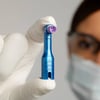Each week, Young Innovations hosts a free CE course for dental hygienists, covering a variety of topics taught by clinicians from all walks of the profession. Whether you missed the live webinar or were able to attend, these course notes are intended to support clinicians with quick, digestible takeaways from our CE courses.
Your patients may or may not know just how helpful xylitol can be for their oral health. Here’s a quick reference guide with five short-and-sweet tips you can use to help them navigate the ins-and-outs of xylitol.
A sugar substitute
Xylitol is a carbon sugar alcohol used as a sugar substitute. It is not an artificial sweetener!
Naturally occurring
Xylitol is naturally occurring and can be found in vegetables and fruits; hardwoods such as birch and corncobs; and even the human body.
Versatile
Xylitol easily replaces sugar due to its 1:1 ratio to sugar, and it has so many added benefits: prevention against dental caries, inhibiting bacterial growth, and even preventing ear and sinus infections.
'Strive for Five'
For maximum oral health benefits, we should “Strive for Five” by completing five xylitol exposures per day through use of mints, gums, crystals/powders or brushing with a toothpaste containing xylitol twice per day. Xylitol in excess of 15g per day may cause gastrointestinal upset.
Not safe for dogs
Xylitol is not safe for dogs and may cause injury or death due to your pet’s lack of ability to metabolize the xylitol. They could go into hypoglycemic shock.
For other useful quick facts and tips, visit the Patient Care section of our blog.




Submit a Comment